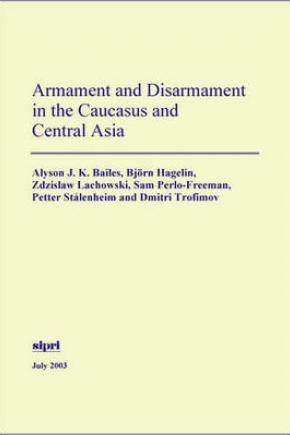Armament and Disarmament in the Caucasus and Central Asia
Since the publication of Gennady Chufrin's edited book on The Security of the Caspian Sea Region in 2001, SIPRI has not attempted to maintain a special research focus on the affairs of the Caucasus region and Central Asia. Our decision nevertheless to offer this modest Policy Paper now reflects two considerations. First, and despite some progress in clarifying the oil-related issues covered in the previous volume, these regions have again become a target of considerable strategic attention and have been exposed to new political/military challenges as a result principally of the US-led 'war on terrorism'. Second, at a time when the regional security agenda is being reopened and reassessed, we considered that it might be helpful to throw into the debate some detailed factual information of the sort traditionally gathered by SIPRI—on such important but often under-discussed dimensions as the actual pattern of military spending and defence development, arms transfers within and beyond the region, and the applicability and effectiveness of arms control and confidence-building measures.
The authors of this Policy Paper include representatives of three different SIPRI project teams and a qualified Russian expert. The picture which emerges from their interlocking contributions is of two regions caught between fast-evolving and often contradictory agendas: the priorities and power-based logic of the war on terrorism; the dead weight and remaining dangers of indigenous conflicts; the appeal and normative pressure of European-style global and regional integration; and the continued very serious flaws in governance in the countries concerned when judged by both value-related and efficiency-related standards. The great northern neighbour, Russia, remains an ambivalent force in all these dimensions. Greater attention by a wider (including a European) audience to these issues and to the related risks and opportunities would be timely and welcome, and our best hope is that the present Policy Paper may help to encourage it.
Click here to download Policy Paper No. 3
About the authors
Alyson J. K. Bailes (United Kingdom) became Director of SIPRI in July 2002. She served in the British Diplomatic Service for 33 years, most recently as British Ambassador to Finland. She has spent several periods on detachment outside the Service, including two academic sabbaticals, a two-year period with the British Ministry of Defence, and assignments to the European Union and the Western European Union. Her main analytical interests are politico-military affairs, European integration and Central European affairs. She has published extensively in international journals on these subjects as well as on Chinese foreign policy.
Dr Björn Hagelin (Sweden) is the Leader of the SIPRI Arms Transfers Project. Before joining SIPRI in 1998, he was a Researcher and Associate Professor at the Department of Peace and Conflict Research, Uppsala University, for 10 years, and before that a security analyst at the Swedish National Defence Research Institute (FOA). His publications include books, chapters and articles about security policy, the military industry, arms transfers and related topics. He recently contributed to Maciejewski, W. (ed.), The Baltic Sea Region: Cultures, Politics, Societies (Baltic University Press: Uppsala, 2002).
Dr Zdzislaw Lachowski (Poland), Leader of the SIPRI Project on Conventional Arms Control, worked formerly at the Polish Institute of International Affairs in Warsaw. He has published extensively on the problems of European military security and arms control as well as on European politico-military integration, is the author of The Adapted CFE Treaty and the Admission of the Baltic States to NATO (SIPRI Policy Paper, 2002), and has contributed to the SIPRI Yearbook since 1992.
Dr Sam Perlo-Freeman (United Kingdom) is currently a Lecturer in Economics at the University of the West of England, Bristol. He worked from November 2002 to July 2003 on the SIPRI Military Expenditure and Arms Production Project as the Research Assistant responsible for Latin America and Europe. His PhD thesis was on 'The demand for military spending in developing countries' and he is the co-author of several papers on military expenditure published or forthcoming in the International Review of Applied Economics and Defence and Peace Economics, as well as the chapter on military expenditure of the SIPRI Yearbook 2003.
Petter Stålenheim (Sweden) is a Researcher on the SIPRI Military Expenditure and Arms Production Project where he is responsible for the military expenditure database and for the collection and analysis of military expenditure data in Asia and the former Soviet Union. He has contributed to the SIPRI Yearbook since 1998, and has been a consultant to the International Institute for Democracy and Electoral Assistance (International IDEA) in Stockholm and lectured at a George C. Marshall Center course in military economics.
Dmitri Trofimov (Russia) is a Counsellor in the Foreign Policy Planning Department of the Ministry of Foreign Affairs of the Russian Federation. He has specialized in the security problems of Central Asia, including Russian foreign policy objectives in the region and writes here in a personal capacity.
Armament and disarmament in the Caucasus and Central Asia: An introduction
Alyson J. K. Bailes
1. Military expenditure in the South Caucasus and Central Asia
Sam Perlo-Freeman and Petter Stålenheim
2. Arms transfers to the South Caucasus and Central Asia compared, 1992–2002
Björn Hagelin
3. Arms control in the Caucasus
Zdzislaw Lachowski
4. Arms control in Central Asia
Dmitri Trofimov
Appendix A. Register of major conventional weapons imported by the countries of the South Caucasus and Central Asia, 1992–2002
Appendix B. Register of major conventional weapons exported by the countries of the South Caucasus and Central Asia, 1992–2002



